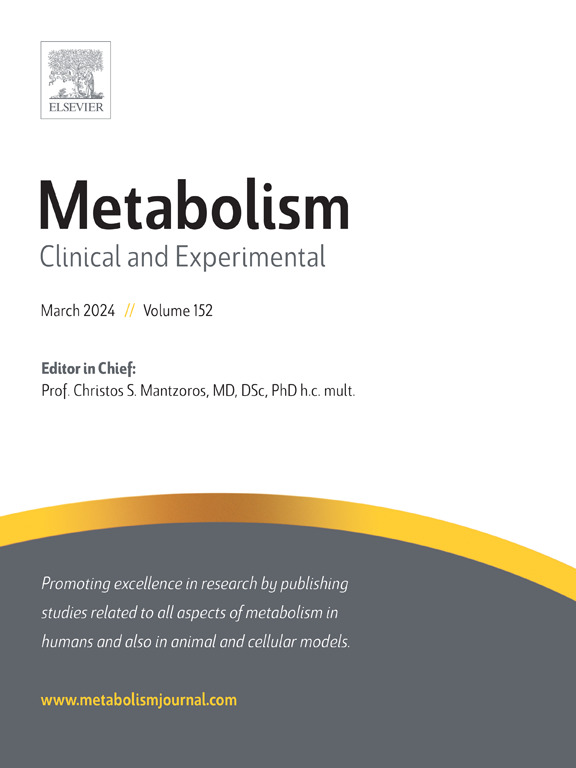USP48 protects against myocardial ischemia-reperfusion injury by stabilizing and upregulating CNN1 in type 1 diabetes mice
IF 11.9
1区 医学
Q1 ENDOCRINOLOGY & METABOLISM
引用次数: 0
Abstract
Ubiquitin-specific protease 48 (USP48) plays an important role in the regulation of DNA repair and immune signaling in health and diseases. Nonetheless, its implication in the development of diabetes-accelerated myocardial ischemia/reperfusion (I/R) injury (MI/RI) has yet to be clarified. Diabetic mice were constructed by streptozotocin (STZ) injection, and MI/RI was then induced by coronary artery occlusion and reperfusion. H9c2 cells were exposed to high glucose (HG) for 24 h, followed by hypoxia/reoxygenation (H/R) for 4 and 2 h, respectively. USP48 protein and mRNA levels were downregulated in MI/RI mice or H/R-exposed cardiomyocytes, but were unexpectedly upregulated in diabetic mice following MI/RI and H9c2 cells exposed to HG and H/R. Cardiac-specific deficiency of USP48 worsened cardiac dysfunction, increased post-ischemic infarction size, promoted mitochondrial damage in myocardial cells, accelerated cardiomyocyte inflammation, oxidative stress, and apoptosis in diabetic mice. Conversely, such pathological conditions were ameliorated by cardiac-specific overexpression of USP48. Proteomics and experimental validation showed that USP48 stabilized and upregulated calponin 1 (CNN1) to confer cardioprotection, since silencing CNN1 minimized the benefits of USP48 in diabetes-aggravated cardiomyocyte injury. RNA sequencing and experimental data demonstrated that the USP48/CNN1 axis inhibited the release of CXC motif chemokine ligand 1 (CXCL1) and CXCL2 through inactivating the ERK1/2 pathway. Eventually, blockade of CXCL1/2 with specific antibodies protected against diabetes-exacerbated MI/RI, akin to USP48 overexpression. Together, these results highlight USP48 as a potential therapeutic target for managing diabetes-aggravated MI/RI by regulating the CNN1/ERK1/2/CXCL1/2 signaling pathway.

USP48通过稳定和上调1型糖尿病小鼠CNN1来保护心肌缺血-再灌注损伤
泛素特异性蛋白酶48 (USP48)在健康和疾病的DNA修复和免疫信号调控中发挥重要作用。尽管如此,其在糖尿病-加速心肌缺血/再灌注(I/R)损伤(MI/RI)发展中的意义尚未明确。采用链脲佐菌素(STZ)构建糖尿病小鼠,冠脉闭塞再灌注诱导心肌梗死/再灌注。H9c2细胞暴露于高糖(HG) 24 h,然后分别缺氧/再氧化(h /R) 4 h和2 h。USP48蛋白和mRNA水平在MI/RI小鼠或H/R暴露的心肌细胞中下调,但在MI/RI和H9c2细胞暴露于HG和H/R后,糖尿病小鼠中USP48蛋白和mRNA水平意外上调。在糖尿病小鼠中,心脏特异性USP48缺乏会加重心功能障碍,增加缺血梗死后的大小,促进心肌细胞线粒体损伤,加速心肌细胞炎症、氧化应激和凋亡。相反,心脏特异性的USP48过表达会改善这种病理状况。蛋白质组学和实验验证表明,USP48稳定和上调钙钙蛋白1 (CNN1),从而赋予心脏保护作用,因为沉默CNN1使USP48在糖尿病加重的心肌细胞损伤中的益处最小化。RNA测序和实验数据表明,USP48/CNN1轴通过失活ERK1/2通路抑制CXC基序趋化因子配体1 (CXCL1)和CXCL2的释放。最终,特异性抗体阻断CXCL1/2可防止糖尿病加重的MI/RI,类似于USP48过表达。总之,这些结果强调了USP48是通过调节CNN1/ erk1 /CXCL1/2信号通路来控制糖尿病加重的MI/RI的潜在治疗靶点。
本文章由计算机程序翻译,如有差异,请以英文原文为准。
求助全文
约1分钟内获得全文
求助全文
来源期刊

Metabolism: clinical and experimental
医学-内分泌学与代谢
CiteScore
18.90
自引率
3.10%
发文量
310
审稿时长
16 days
期刊介绍:
Metabolism upholds research excellence by disseminating high-quality original research, reviews, editorials, and commentaries covering all facets of human metabolism.
Consideration for publication in Metabolism extends to studies in humans, animal, and cellular models, with a particular emphasis on work demonstrating strong translational potential.
The journal addresses a range of topics, including:
- Energy Expenditure and Obesity
- Metabolic Syndrome, Prediabetes, and Diabetes
- Nutrition, Exercise, and the Environment
- Genetics and Genomics, Proteomics, and Metabolomics
- Carbohydrate, Lipid, and Protein Metabolism
- Endocrinology and Hypertension
- Mineral and Bone Metabolism
- Cardiovascular Diseases and Malignancies
- Inflammation in metabolism and immunometabolism
 求助内容:
求助内容: 应助结果提醒方式:
应助结果提醒方式:


